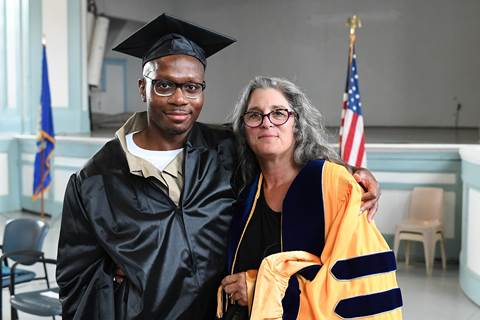Two of Wesleyan’s Graduating Philosophy Majors Earned Their Degrees While Incarcerated
Two philosophy majors graduating this year from Wesleyan University earned their degrees while incarcerated.

David Haywood and Lori Gruen in 2018 at graduation ceremony for Haywood’ Associate in Arts degree.
The students’ educations were facilitated through Wesleyan’s Center for Prison Education (CPE).
James Davis III will be graduating with a double major in Philosophy and English. A published author, his writings include “Law, Prison, and Double-Double Consciousness: A Phenomenological View of the Black Prisoner’s Experience,” which appeared in The Yale Law Journal in 2019. Here’s the abstract of the article:
This essay introduces double-double consciousness as a new way of conceptualizing the psychological ramifications of being a black prisoner. It begins by revisiting W.E.B. DuBois’s theory of double consciousness. It then offers a phenomenological exposition of double-double consciousness—the double consciousness that the black prisoner came to prison with, coupled with the double consciousness that the black prisoner develops in prison. Thought and feeling, time and space are all different in the prison. This world relentlessly imposes the prisoner identity on all those who inhabit it, requiring them to reconcile their new status with their conceptions of self. Based on my own experience as a black prisoner, I conclude that double-double consciousness is a mechanism through which the prisoner can maintain dignity despite living in captivity.
David Haywood will be graduating with High Honors in Philosophy. Lori Gruen, a philosophy professor at Wesleyan who works with the CPE, says that Mr. Haywood is “the first of our Center for Prison Education’s student to attempt an honors thesis and was terrifically successful.” He is also the 2023 Wise Prize recipient, a prize established by Daniel Wise (Wesleyan class of 1859), to recognize student excellence in philosophy. Mr. Haywood’s thesis is entitled “On Being Haunted: Affective Violence in Colonial Modernity.” Professor Gruen says:
This is a profound work of interdisciplinary philosophical scholarship that gives voice to the experience of the emotional, embodied terror of being disappeared. Haywood’s thesis addresses what it means to experience what he calls “haunting or affective violence” and how to resist it. Writing an honors thesis while in prison, with very limited access to a computer on which to type and no internet access, seemed almost impossible. It is a testament to David Haywood’s commitment and vision that this brilliant work was completed.
In 2021, three incarcerated students earned their undergraduate degrees in philosophy from Wesleyan.



Congratulations to Mr. Davis and Mr. Haywood, and kudos to their professors and to Wesleyan for doing this important work.
More along these lines:
Incarceration, Individuation, and Self-Realization: Art, Literature, and Education in Prison (These titles have been culled from my bibliography for ‘punishment and prison.’)
Bernstein, Lee (2010) America is the Prison: Arts and Politics in Prison in the 1970s. Chapel Hill, NC: University of North Carolina Press.Brottman, Mikita (2016) The Maximum Security Book Club: Reading Literature in a Men’s Prison. New York: HarperCollins. Chevigeny, Bell Gale, ed. (1999) Doing Time: Twenty-Five Years of Prison Writing. New York: Aracade. Davies, Ioan (1990) Writers in Prison. Oxford, UK: Basil Blackwell.Desai, Ashwin (2014/ Unisa Press, 2012) Reading Revolution: Shakespeare on Robben Island. Chicago, IL: Haymarket Books.Fleetwood, Nicole R. (2020) Marking Time: Art in the Age of Mass Incarceration. Cambridge, MA: Harvard University Press. Franklin, H. Bruce (1978) The Victim as Criminal and Artist: Literature from the American Prison. New York: Oxford University Press. Franklin, H. Bruce (1998) Prison Writing in Twentieth Century America. New York: Penguin Books. Fyfe, Janet (1992) Books Behind Bars: The Role of Books, Reading, and Libraries in British Reform, 1701-1911. Westport, CT: Greenwood Press. Harlow, Barbara (1992) Barred: Women, Writing and Political Detention. Hanover, NH: Wesleyan University Press.James, Joy, ed. (2003) Imprisoned Intellectuals: America’s Political Prisoners Write on Life, Liberation, and Rebellion. Lanham, MD: Rowman & Littlefield.James, Joy, ed. (2005) The New Abolitionists: (neo)Slave Narratives and Contemporary Prison Writings. Albany, NY: State University of New York Press.Karpowitz, Daniel (2017) College in Prison: Reading in an Age of Mass Incarceration. New Brunswick, NJ: Rutgers University Press. Kathrada, Ahmed (with Tim Couzens) (2016) A Simple Freedom: The Strong Mind of Robben Island—Prisoner No. 468. Lexington, KY: University Press of Kentucky. Kornfeld, Phyllis (1997) Cellblock Visions: Prison Art in America. Princeton, NJ: Princeton University Press. Lagemann, Ellen Condliffe (2016) Liberating Minds: The Case for College in Prison. New York: The New Press. Mbeki, Govan (1991) Learning from Robben Island: The Prison Writings of Govan Mbeki. London: James Currey/Athens, OH: Ohio University Press/Cape Town: David Philip.Miller, D. Quentin, ed. (2005) Prose and Cons: Essays on Prison Literature in the United States. Jefferson, NC: McFarland.Scheffler, Judith A., ed. (2002) Wall Tappings: An International Anthology of Women’s Prison Writings, 200 [CE] to the Present. New York: Feminist Press.Schorb, Jodi. (2014) Reading Prisoners: Literature, Literacy, and the Transformation of American Punishment, 1700-1845. New Brunswick, NJ: Rutgers University Press.Schreiner. Barbara, ed. (1992) A Snake with Ice Water: Prison Writings by South African Women. Johannesburg: Congress of South African Writers. Sweeney, Megan (2010) Reading Is My Window: Books and the Art of Reading in Women’s Prisons. Chapel Hill, NC: University of North Carolina Press.Waldman, Ayelet and Robin Levi, eds. (2011) Inside This Place, Not of It: Narratives from Women’s Prisons. San Francisco, CA: McSweeney’s Books and Voice of Witness.
I don’t know what happened to the bulleted list (I edited it several times so it would be formatted correctly), I apologize for it turning out like this. I can always send it along properly formatted to anyone wanting a copy.